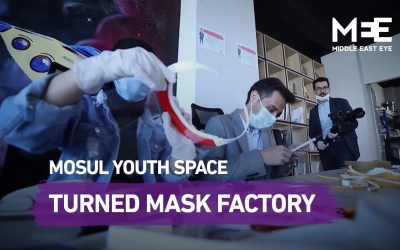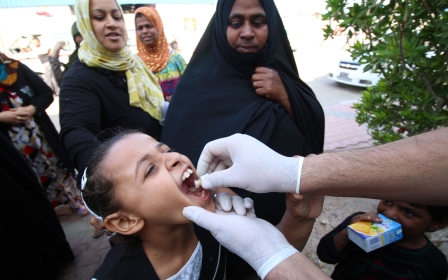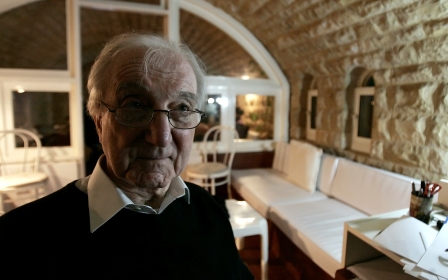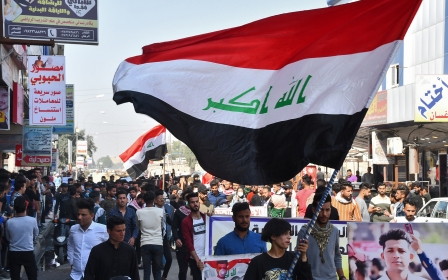Coronavirus: Iranian goods trucks still entering Iraq despite official ban

Deliveries are still taking place between Iran and Iraq despite the government officially closing the borders over concerns about the spread of the coronavirus pandemic.
Locals in the southern city of Basra, which is close to the border with Iran, told Middle East Eye that trucks carrying food from Iran were still crossing the border and many Iranian products were still appearing on their shelves.
Basra is Iraq's main trading hub, bordering three countries, Kuwait and Saudi Arabia from the south, and Iran from the east by the Shalamcheh trade crossing border.
A veterinarian working near the border crossing said food trucks were still entering the city on a daily basis.
He said the trucks were backed by powerful militia groups and went untouched by the local security services.
New MEE newsletter: Jerusalem Dispatch
Sign up to get the latest insights and analysis on Israel-Palestine, alongside Turkey Unpacked and other MEE newsletters
'Every day, after midnight, I see many trucks loaded with different kinds of items, mostly food, smoothly crossing the checkpoints without being subjected to health tests'
- Basra local
“Every day, after midnight, I see many trucks loaded with different kinds of items, mostly food, smoothly crossing the checkpoints without being subjected to health tests," he said, requesting anonymity.
"We cannot say no, otherwise we become a target."
Iran has been the worst hit country in the Middle East by the coronavirus. As the infection rate began to increase rapidly, the Iraqi government ordered the border with its neighbour closed, except to diplomats.
Colonel Bassem Ghanem, the local police spokesperson in Basra, told MEE that the land border with Iran was definitely closed.
“Ports are still open for trade, our borders with Syria and Turkey are open too, but they are closed with Iran and Kuwait," he said.
But other locals told MEE that scores of trucks were transporting their wares through this border on a daily basis. Residents are demanding the authorities enforce the crackdown, fear the outbreak will tax Iraq’s fragile healthcare system.
"The border is open and vehicles loaded with all kind of goods enter Basra city via the Shalamcheh border, but the government refuse to release that to the media, and that is why Basra recorded the highest number of infections every day,” said Ahmed Alaa, a Basra citizen.
“Our health is more important than food.”
Pandemic schmandemic
As of 20 April, Iraq had recorded 1,574 cases of Covid-19, including 82 deaths and 1,043 recoveries, according to the health ministry. Some reports have suggested the figures could much higher and that the government has not been accurately relaying the number of confirmed cases.
In order to enforce social distancing measures required for preventing the spread of the virus, the Iraqi government imposed a curfew across the country on 15 March, shuttering airports, offices, closing schools and ordering people to largely remain at home.
The move has, however, put a strain on an economy that is heavily dependent on its larger neighbour Iran for essential goods.
In December, the chairman of the Trade Promotion Organization of Iran, Hamid Zadboum, told media outlets the value of Iranian exports to neighbouring Iraq amounted to a quarter of the Arab country’s total imports.
Basra is particularly reliant.
"Basra became a consumer city. More than 90 percent of our goods are imported, mostly from Iran," said Naeem Sabah, dean of the Department of Economy at the University of Basra.
The influence of powerful armed militias, mostly supported by Iran, in Basra has also ensured the city's links to Iran remained strong, and smuggling routes have continued despite restrictions.
Locals told MEE that many Iranian food items were still available on the shelves of shops in Basra, labelled "made in Iran" which they said made them fearful of infection.
“I prefer the Iraqi products because they taste good and better than the imported products. All our products are natural but the imported ones are mostly chemically treated,” said Alaa.
“The government thinks in favour of Iran and its interests more than Iraq’s interests, while Iran cares about itself. I know that Iraq depends on Iran for food still, but our health should be the priority."
'They are the power'
Locals in Basra were among the first to call for restrictions on travel from Iran after the country first detected the coronavirus in the holy city of Qom in February.
The veterinarian said they were, however, powerless to take any further action.
"Sometimes we prevent trucks from entering the Iraq side but security bodies allow them to enter," he said.
“Could doctors prevent traders belonging to parties and militias in a country such as Iraq? Of course not - they are the power.”
Middle East Eye delivers independent and unrivalled coverage and analysis of the Middle East, North Africa and beyond. To learn more about republishing this content and the associated fees, please fill out this form. More about MEE can be found here.





